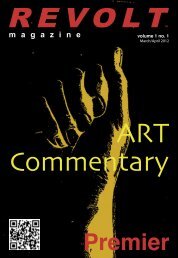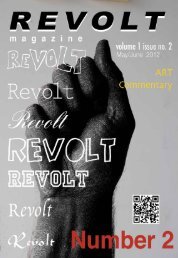Download PDF Version Revolt Magazine, Volume 1 Issue No.4
Download PDF Version Revolt Magazine, Volume 1 Issue No.4
Download PDF Version Revolt Magazine, Volume 1 Issue No.4
You also want an ePaper? Increase the reach of your titles
YUMPU automatically turns print PDFs into web optimized ePapers that Google loves.
narrative, like party at the end of the world,<br />
warning: Fool’s Gold! You’re confronting the pitfalls<br />
of the American Dream/illUZiON when your lyrics<br />
go “money hoes and clothes everything that’s trite”<br />
– but it’s also just a party scene. Hip Hop started<br />
as a bloc party in the Bronx with DJ Kool Herc and<br />
the b-boys, the cops tried to break it up, but hip<br />
hop kept going, and much of the music is<br />
for what I put out and how it’s received. Being able<br />
to find that balance, that sweet spot where the<br />
fun is taking up the same space as the message.<br />
That’s the conflict an artist that has something<br />
to say should have. How can people enjoy this<br />
and how can I still express these points without<br />
preaching, without it being like a fuckin lecture or<br />
something. That’s the conflict I have with<br />
what they want to do, we shouldn’t look to hip hop<br />
right now to be a savior because hip hop’s not<br />
saving anything even if it is positive! It has potential<br />
too and anything has potential too so if you wanna<br />
do something that helps the planet - do it. If Hip<br />
Hop is influencing strong and positive decisions<br />
then wonderful. Something I want to do as an<br />
individual is express what I’m learning and how<br />
I’m growing to help people. I do that NOT through<br />
hip hop, no, just through music. Yo hip hop is very<br />
limited right now. The state of mind in hip hop is<br />
very limited. I like to say things that make people<br />
question what they might value and not value<br />
within society. I just influence a curiosity for life cuz<br />
I’m curious I’m seekin I’m just putting out what I<br />
see fit and I’m not wasting words anymore when it<br />
comes to writing a song.<br />
KC: So there’s your message, the party is the<br />
vehicle, and lastly – yo you guys have a lot of<br />
swag. You have a lot of attitude and confidence, it<br />
only multiplies when you are together, it’s almost<br />
performative. I mean for instance like Tupac, a lot<br />
of people don’t know this but he actually attended<br />
acting school when he was comin up in LA. What is<br />
that? Can you talk about that? How is that part of<br />
what you are doing, is it a tool?<br />
Salomon Faye and Enasni Leber of THEillUZiON, photo credit Dakota Blue Harper.<br />
still oriented around the party meme. In what ways<br />
is engaging the collective more important than the<br />
message, and how can we conceive of the party<br />
environment as a generative, joyful and political<br />
space?<br />
EL: One thing I learned about in NYC is that when it<br />
comes to a party, they are always sort of political.<br />
It’s always political, it’s always everybody in NYC is<br />
selling everything and that’s everywhere. Being at<br />
our gallery Apostrophe we’re used to parties every<br />
week and usually the same people come every<br />
week, every week, and it’s like a ritual - yo - it’s like<br />
church. You get to play a game of life every week.<br />
You go to this party and you play life different every<br />
week. Next week you come and you a boss. Next<br />
week you comin and you ain’t doin much. People<br />
want to pop bottles, they want to trip, they want to<br />
pop a molly, they want to do all of that, they want to<br />
be the man, what? Damn! Bag some bitches! It’s a<br />
fantasy. It’s just not real life. That’s where the fool’s<br />
gold comes into play, that’s why it’s in the video,<br />
naturally, it all comes together.<br />
SF: Catch it Bock Haus<br />
RB: That’s also part of the illusion. Partying is<br />
such a desirable thing, everyone wants to party,<br />
it’s kind of the nature of humanity as a whole.<br />
They want to have fun but I think it’s important to<br />
inject something into that. It can’t just be all about<br />
partying it has to have more meaning than that.<br />
That’s what I get from the illUZiON. If you look at<br />
that video superficially you think oh it’s a party<br />
they’re having a good time da da da but then if you<br />
really pay attention to the words and what is being<br />
said than that is where the political aspect of it<br />
comes in.<br />
SF: straight up! I think it’s for us as artists about<br />
being conscious of what we’re putting out and me<br />
speaking personally I feel a sense of responsibility<br />
everything I create because I’m speaking with<br />
purpose and I want to be heard so I got to think<br />
about my listeners and I know people wanna have<br />
fun. They’re out smoking and drinkin and tryna<br />
have a good time but at the same time let’s create<br />
something out of this wonderful moment. Let’s<br />
grow from it, let’s become stronger.<br />
RB: The party is not the focus it’s just the vehicle<br />
that you put it in.<br />
KC: Many people have situated rappers within<br />
terms of the West African Griotic tradition, a Griot<br />
being a praise singer of a socially<br />
marginal position with biting wit and political<br />
commentary. He is the repository of the oral<br />
tradition of the culture and he pays for his freedom<br />
by a marginalization that follows him to the grave,<br />
literally, he’s not permitted to be buried with the<br />
regular folk of society. In the United States we<br />
have the race issue, and often hip hop is seen<br />
as a type of insurrectionary knowledge about<br />
the true state of things that has pushed its way<br />
through music when, barred from other outlets<br />
such as mainstream News. Like Salomon when<br />
you say “Last time I met a whore, met her with a<br />
metaphor…” you’re making a social commentary<br />
in a multiplicity of ways. Do you relate to the<br />
role of the contemporary griot and do you feel a<br />
responsibility when you rhyme to speak of and for<br />
the unseen and unheard in our society?<br />
SF: Aight, ok one right now I wouldn’t say hip hop<br />
is being used to improve society, it’s just not. It<br />
was at a time but right now I don’t even know what<br />
hip hop is, but it’s cool. I identify as just being an<br />
artist in general and an aspect of my expression is<br />
hip hop so WORD. With that said I feel responsible<br />
for how and what I say and how I come off as<br />
an emcee, as a part of hip hop. However, I don’t<br />
feel responsible for or think hip hop should be<br />
responsible for socially anything. People can do<br />
SF: I feel like it’s a developed confidence. I<br />
wouldn’t have always been able to express myself<br />
like this in an interview, in front of a camera, on a<br />
microphone, in a performance. This is natural but<br />
this is over time. I remember when I was scared<br />
to rap in front of people, but I was different in my<br />
room or in front of someone I’m close to. Now it’s<br />
me naturally feeling close to everybody and being<br />
at a level so comfortable with myself and aware of<br />
myself and comfortable with who I am that this is<br />
just what happens.<br />
EL: Yea yo, what you see is what you get. I mean yo<br />
like you develop habits and these habits become<br />
your character and you need different characters<br />
for different things. I’m me right now, I’m chillin, I’m<br />
cool. If I need to be on point I’ll be on point. I might<br />
go up to someone else and just be Joshua. It’s like<br />
whatever.<br />
SF: That’s where I feel like the art of personality<br />
comes into existence. This is just our personality yo<br />
and that has a big part to do with God.<br />
EL: We pray a lot, we meditate a lot.<br />
SF: We get lost<br />
EL: We read a lot<br />
KC: What do you read?<br />
RB: Ancient Scrolls<br />
EL: Fiction too, I like being creative and I like<br />
creative books, man I just read -<br />
SF: I didn’t like fiction until I read Clockwork<br />
Orange. Aight, boom! Conversations with God.<br />
DAMN Bro. I’ve been like unraveling this truth, you<br />
know like moving the clouds out of the way and the<br />
sunlight has been allowing me to see.<br />
KC: Afrika Bambaataa calls the 5th element of Hip<br />
Hop “Knowledge of self in the community” Does<br />
this resonate with you? What is the significance of<br />
the posse mentality to your work?<br />
SF: Posse mentality?<br />
REVOLT <strong>Magazine</strong> Number 4, 2013 46





